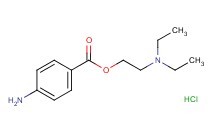Procaine hydrochloride
Inquiry
| Post Date: | Apr 21,2016 |
| Expiry Date: | Oct 18,2016 |
| Detailed Description: |
Cas No. :51-05-8
Function:
Procaine is a kind of local anesthetics. With low toxicity but quick and safe effects, procaine is suitable for local anesthesia, applied to the eye, ear, nose, teeth and other department operation, used for infiltration anesthesia, anesthesia and closed therapy supervisor. Procaine is also used in the production of procaine penicillin.Procaine causes loss of feeling (numbness) of skin and mucous membranes.Procaine is used as an injection during surgery and other medical and dental procedures. Hormones and Regulation of Endocrine Function of Drug, Regulating Water and Salt, Electrolyte and Acid-Base Balance of Medicine, Anesthetic and Adjuvant, Blood System Agents, Drug Treatment of Mental Disorder, Visceral System Medication, Cardiovascular Agents, Respiratory System Agents, Disinfectant and Preservatives. Application: Procaine HCl is a local anesthetic drug of the amino ester group. It is used primarily to reduce the pain of intramuscular injection of penicillin, and it is also used in dentistry. Owing to the ubiquity of the trade name Novocain, in some regions procaine is referred to generically as novocaine. It acts mainly by being a sodium channel blocker.Today it is used therapeutically in some countries due to its sympatholytic, anti-inflammatory, perfusion enhancing, and mood enhancing effects. Procaine HCl is indicated for the production of local or regional analgesia and anesthesia by local infiltration and peripheral nerve block techniques. Application of procaine leads to the depression of neuronal activity. The depression causes the nervous system to become hypersensitive producing restlessness and shaking, leading to minor to severe convulsions. Studies on animals have shown the use of procaine led to the increase of dopamine and serotonin levels in the brain.Other issues may occur because of varying individual tolerance to procaine dosage. Nervousness and dizziness can arise from the excitation of the central nervous system, which may lead to respiratory failure if overdosed. Procaine may also induce weakening of the myocardium leading to cardiac arrest. Procaine can also cause allergic reactions causing the individuals to have problems with breathing, rashes, and swelling. Allergic reactions to procaine are usually not in response to procaine itself, but to its metabolite PABA. About one in 3000 people have an atypical form of pseudocholinesterase,[citation needed] which does not hydrolyze ester anesthetics such as procaine, resulting in a prolonged period of high levels of the anesthetic in the blood and increased toxicity. |
| CAS Registry Number: | 51-05-8 |
| Synonyms: | ;2-(Diethylamino)ethyl 4-aminobenzoate;Procaine Hcl;ATOXICAINE;2-(diethylamino)ethyl 4-aminobenzoate hydrochloride (1:1);2-methylpropyl 4-aminobenzoate hydrochloride; |
| Molecular Formula: | C13H21ClN2O2 |
| Molecular Weight: | 272.771 |
| Molecular Structure: | 
|
| Hazard Symbols: |  T:Toxic; T:Toxic; |
| Risk Codes: | R25:; R36/37/38:; |
| Safety Description: | S26:; S37/39:; S45:; |
| Company: | yuanchenggroup [ China ] |
| Contact: | houfulin |
| Tel: | +86-027-50756065 |
| Fax: | |
| Email: | ycshx@yccreate.com |
-
Disclaimer statement:The information and data included above have been realized by the enterprises and compiled by the staff, and are subject to change without notice to you. The Chemnet makes no warranties or representations whatsoever regarding the facticity, accuracy and validity of such information and data. In order to ensure your interest, we suggest you chose the products posted by our gold suppliers or VIP members.


